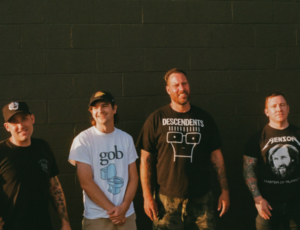
Will Sheff is an honest guy. Sitting on a beat-up leather couch in the drab and cramped back stage room of The Rickshaw Theatre, the indie rock star seems understandingly unimpressed with his surroundings. Sheff admits that all the things he didn’t like about touring ten years ago are a “million more times not fun,” but the actual performing part “is more fun to me than it’s ever been.”
The Okkervil River frontman has played on and produced more records than he can remember, but his band’s seventh release, The Silver Gymnasium, is an album about something that no one ever forgets – their childhood. More specifically, it’s an album about Sheff’s hometown of Meriden, New Hampshire.
“I don’t try to tell specific stories from my childhood from beginning to end… just to try to shine a light on things.” Sheff describes The Silver Gymnasium as taking stock of where he’s at in his life now, through the lens of where he was then.
“To a certain extent, it’s about nostalgia, and I hope not necessarily nostalgic itself. The goal is not to get the exact accurate picture of what my childhood is like. I’m trying to be more impressionistic because really I’m hoping other people can relate, and that doesn’t need to be specific.”
Sheff parents moved away from Meriden in 1995, which he accounts for the way he’s romanticized his hometown. “It became a bubble in my mind.”
The emotional response heading back to your hometown often creates, Sheff pegs it down to the fact you can’t go back to that time.
“I mean, nobody has a completely happy childhood; [everyone] probably has moments of carefreeness, moments of imaginative play, moments of really strong friendships, moments of feeling safe. Your whole life was stretched out in front of you and you felt like nothing bad was ever going to happen to you. The possibility of your own death was so abstract it didn’t seem real.”
Although his parents have moved away, Sheff did return to Meriden a few years ago, an event he describes as very powerful.
The beauty of The Silver Gymnasium and Sheff’s back catalogue as a whole is his ability to convey raw emotions without crossing the very fine line that falls into the trap of sentimentality.
“In writing, being really specific is really powerful. People respond to real details, that sound right, that sound real. So that’s where I come from. I went through a phase of writing where I set my filter really tight. I was trying really hard to be really novel in the way I expressed myself and the language got almost gnarled and I started to realize it’s okay to say things like, ‘Why don’t you love me?’, or ‘I really miss you,’ or things like that. It’s OK to make these open declarations of emotion.”
What Sheff can’t stand is the “I can’t breathe,” from the Miley Cyruses of this world. “Whoever the fuck wrote that was not thinking about how they really feel, and how things really feel, and what the real truth of a situation is.”
The key, he says, is not to lie. “There’s something very inauthentic about using charged wordplay. You can be really simple and say basic emotional things that everybody says, as long as they’re authentic.”
To avoid sentimentality, Sheff has developed different songwriting techniques to try to tap into the subconscious. Recording drafts of songs on an old Walkman with awful sound quality has allowed Sheff the opportunity to sing whatever comes to mind when listening back. “I can’t remember what I said, and I can’t tell from the recording, so then I do a third level of, ‘What does it sound like I’m saying?’”
Sheff’s unsure of how many copies he’s sold of either The Silver Gymnasium or any part of his discography. “I’m not very good with stuff like that,” but admits if his band has been around before the downloading and streaming age, there would be a lot more money around. “I don’t know if that [money] would have made it better.”
David Bryne recently wrote an article for The Guardian saying he’d pulled his music off streaming services and feared for the future of music in the Internet age.
“I think he really nailed the problem.” Sheff explains it’s not about hurting your bottom line – it’s about the erosion of culture when only one entity can afford to do something. “I don’t want to live in a world where there are no more rock bands because no one can afford to do it.”
Sheff is not being greedy; rather, he thinks that’s the defense people use out of guilt because they listen to Spotify and they feel they’re being shamed.
Sheff worries that if nobody can make any money from music, it will have a disastrous effect on culture. The Silver Gymnasium is beautifully packaged on gatefold vinyl with picturesque illustrations of Meriden. Sheff says that listening to music on your computer with ads has no personal connection with art – the gatefold and the artwork are all part of the music.
Sheff’s surprised Spotify isn’t available in Canada, and when he learns a message comes up for Canadian users on their website indicating this, he jokes it should say, “This is immoral! Why are you giving money to a bunch of Swedish tech douchebags instead of the artist that made the music that you like?”
The rest of the band enters the room and, what was cramped with just the two of us, now seems claustrophobic. Sheff offers me a beer for the road and as the band is coming on stage in a few minutes, I let him get on with it. He leaves me with his thoughts on art.
“Art is like magic, it’s like casting your magical spell. It’s one of the only ways you feel like you get around death. You feel like you get around normal life through art. It’s like a sacred thing and I really want to make it super special.”










